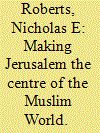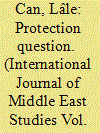| Srl | Item |
| 1 |
ID:
105630


|
|
|
|
|
| Publication |
2011.
|
| Summary/Abstract |
The foreign policy of the Islamic Republic of Iran is widely misunderstood. On the one hand many experts regard the Iranian foreign policy as being essentially ideology driven while on the other hand a significant body of opinion believes that ideology is a convenient smokescreen for Iran's pursuit of its national interests. This paper examines the role of ideological, political and institutional actors in the context of the Islamic Republic's quest for consensus and cohesion. The purpose is to delve into the relationship between these factors with a view to understanding how this complex interaction impacts on foreign policy formulation and implementation. It is proposed that any improvement to the current system requires a more transparent strategic direction.
|
|
|
|
|
|
|
|
|
|
|
|
|
|
|
|
| 2 |
ID:
165586


|
|
|
|
|
| Summary/Abstract |
This article investigates the place of Jerusalem in the interwar Pan-Islamic movement through a discussion of the history of how the city came to host the World Islamic Congress of 1931. Arguing against the conventional view that the congress was an unproductive diversion for the Palestinian national movement, it considers how the congress both promoted the Palestinian cause to the wider Muslim world and how it represented Jerusalem’s successful integration into interwar Islamic political networks. The imperial context is also considered at length, not only in terms of the imperial power’s treatment of Pan-Islamism but also in terms of how imperial connections helped the conference’s co-organizers Hajj Amin al-Husayni, the mufti of Jerusalem, and Shawkat ‘Ali, a leading Indian Pan-Islamist connect across national borders.
|
|
|
|
|
|
|
|
|
|
|
|
|
|
|
|
| 3 |
ID:
147887


|
|
|
|
|
| Summary/Abstract |
This article examines the impact of the Ottoman Empire's battle against legal imperialism on the status of Central Asians in its domains, specifically after the promulgation of a nationality law in 1869 that classified them as foreigners. It traces how the threat of Muslim colonial subjects attaining European consular protections led to the emergence of a “Central Asian protection question”: whether Afghans, Bukharans, and Chinese Muslims had legitimate claims to European legal nationality and, by extension, capitulatory privileges. Through a number of case studies, the article shows how the Ottoman Foreign Ministry fused international legal norms and pan-Islamic claims to arrive at the position that Central Asians from informally colonized lands were not “real” subjects of European empires, and that they were under the exclusive protection of the caliphate. This strategy, I argue, undermined the creation of an Ottoman citizenship boundary and opened up a complex field of inter- and intraimperial contestation about who was a foreigner. In contrast to positive associations with legal pluralism in this period, Central Asian migrants and pilgrims who were protected by the caliph but not recognized as Ottomans or European subjects found that they could not benefit from practices such as forum shopping and affiliation switching. And while the notion of foreignness remained subject to multiple and conflicting interpretations across the empire, I argue that nationality as a legal category was incontrovertibly becoming a defining feature of these foreign Muslims' rights and status in the sultan's domains.
|
|
|
|
|
|
|
|
|
|
|
|
|
|
|
|